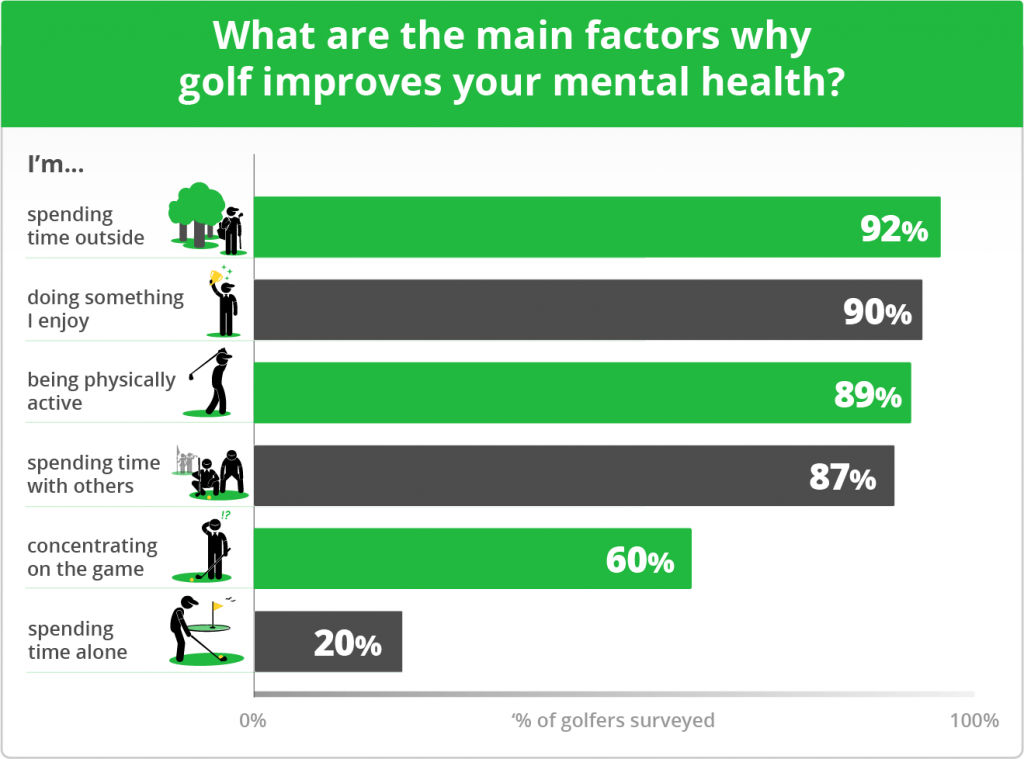Golf and mental health: survey findings

Mental
health is arguably a topic of more conversation now than ever before—including
in sport.
Whether it’s boxer Tyson Fury opening up about his past struggles, ex-footballers like Clarke Carlisle and Paul Merson discussing theirs, or, more recently, Rory McIlroy talking about his mental health and its impact on his golf—conversations surrounding mental health in sport are not uncommon.
But away
from the professional game, and when it comes to your everyday hobbyist golfer,
how much mental health awareness exists in the UK game?
Do people
view golf as something that positively impacts their mental health? Do UK
golfers feel comfortable discussing mental health out on the course or in the
clubhouse after a round?
We surveyed 1,623 UK golfers to find out.
Golf and mental health: the research
Of the
1,623 survey respondents, 93% were male.
In total, 28% of golfers said they had experienced a mental health problem in their life, while 8% said they were unsure whether they had or hadn’t.
The survey results overwhelmingly favoured the view that playing golf is good for people’s mental health. In fact, a huge 95% of golfers surveyed said the sport was good for mental health, with 89% saying it had had a positive impact on theirs.
Just 1% of golfers said they don’t think golf is good for people’s mental health, and only 4% said playing had not done anything to improve theirs.
Talking about mental health
Though so
much good work has been done to break down some of the stigmas surrounding
mental health, many people still feel uncomfortable talking about it.
However,
more than a third of the golfers we surveyed (36%) said that they’d had
conversations about mental health with fellow golfers that they might not have necessarily
had with other people or friends.
Nearly half
(46%) said they felt comfortable talking about their mental health with fellow
golfers. This would suggest that golf clubs and courses are becoming safer and
more accepting spaces for people with mental health problems to talk.
However,
the results of our survey showed that people still feel more comfortable
talking about mental health in other settings than they do in golf-related
settings. In comparison, 61% said they felt comfortable talking about mental
health with their family.
52% said they felt comfortable discussing mental health with their partner, which, perhaps surprisingly, is more than the amount who said they felt comfortable talking to a doctor (49%).
The mental health benefits of playing golf
We asked golfers what specific benefits they have personally experienced after playing golf.

Distraction
from stress or worry was the leading benefit from the survey, with 77% of
golfers citing it as a benefit. 66% said they had noticed an improvement in
their mood after playing golf, while 46% said golf had boosted their energy
levels.
Both improved sleep and reduced anxiety were cited by 43% of golfers. Increased motivation, self-esteem, and a clearer head also came out as popular benefits.
When asked why they thought golf had these benefits, the majority (92%) said it was the time spent outside that makes golf so beneficial from a mental health perspective.

90% said it
was purely because they enjoyed golf, while 89% said doing something physically
active was a factor in why golf had helped them.
Interestingly,
87% of golfers said that playing golf had improved their mental health because
it meant they were able to spend time with others. Meanwhile, only 20% said it
was because they were able to spend time alone. This would suggest that the
social interaction side of golf is a key factor in why so many people cite it
as a positive mental health influence.
Meeting new people, making friends, brain stimulation, and improved patience were also among the benefits of golf stated by those surveyed.
Golf and mental health: industry awareness
Although 41% of golfers in our survey agreed that their mental health had improved with age, the same percentage said there is still not enough mental health awareness in the UK golf industry, and 45% said they were not sure.
Summary
While there
have undoubtedly been major strides in mental health awareness in golf, and
sport in general, in recent years, it’s clear we still have a way to go.
The more mental health is talked about and accepted, the more comfortable those struggling will feel about opening up. ‘Keep talking’ is our parting message.
Methodology
Golf Care surveyed 1,623 UK golfers across April and May 2023 and analysed their responses.







